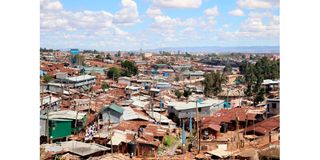Slum women blame global warming for rise in GBV

A section of Kibra slums in Nairobi on November 28, 2021. Women and girls in Nairobi slums are bearing the brunt of the fallout from global warming.
What you need to know:
- More than 70 women leaders from Nairobi informal settlements and outlying areas who attended the 6th Urban Thinkers Campus, cited the rise in gender-based violence as a result of global warming.
- The grassroots leaders noted that they are affected by house fires, which leave them homeless, leading to conflicts and gender-based violence that affect women and girls the most.
Women and girls in Nairobi slums are bearing the brunt of the fallout from global warming.
This emerged during an event dubbed the 6th Urban Thinkers Campus themed Global Warming and Global Justice organised by a Kibra-based gender-focused NGO Polycom Development, at Rowallan Scout’s Camp in Nairobi.
More than 70 women leaders from informal settlements and outlying areas who attended, shared their experiences, citing the rise in gender-based violence (GBV).
The Wamama Tuna Uwezo (women have the capacity) forum coincided with the recent Global Climate Change forum in Glasgow, Scotland.
The grassroots leaders noted that floods trigger agony due to conflicts and recommended how the county and national governments can intervene.
Martha Mwanza from Kiambiu slums said perennial floods leave a trail of destruction, injuries and even deaths.
“We are also affected by house fires, which leave us homeless, leading to conflicts and gender-based violence that affect women and girls the most,” said Mary Elias.
She blamed the floods on deforestation, pollution and environmental degradation along the Nairobi River by city residents, industrialists and traders.
Dandora dumpsite
For Nereah Acham from Korogocho slums, the controversial Dandora dumpsite debate should be concluded. She said despite their protests and the county government’s pledge to relocate it, nothing much has happened even as the stench and water pollution hurt residents, many of whom have suffered from waterborne and respiratory diseases, she said.
“The entire area is unsafe and unhealthy. The river is contaminated by industrial effluence, human waste and garbage, while the fumes from the burning mountains of garbage are an eyesore and pose a serious health risk. In fact, the whole place is a ticking time bomb waiting to explode into pandemic worse than Covid-19,” Ms Acham added.

Dandora dumpsite, the country’s biggest garbage disposal point. The stench and water pollution from the site hurt residents, many of whom have suffered from waterborne and respiratory diseases.
Yet another woman from Mukuru Kwa Njenga slums Hellen Okello, accused the Nairobi Metropolitan Services (NMS) for sleeping on the job.
She said the slum is near Mama Lucy Kibaki Hospital, run by the Nairobi County government and the NMS, and waste including used syringes, sanitary pads and other surgical items, are dumped carelessly, exposing them to disease.
Menstrual hygiene
“When the rains come, it sweeps our houses, toilets and even furniture away, leading to conflicts and rise in sexual and gender-based violence (SGBV). We have always complained, but the authorities and our elected leaders have done nothing about it.”
Judith Shitabule from Kibra said there is a link between global warming and menstrual hygiene in relation to chronic water shortage and sub-standard public toilets, among other problems in the slum.
“When we speak, please, take us seriously. Most of our problems start with poverty and have led to rise in sexual exploitation of women and girls. Several cases of sexual harassment and abuse of schoolgirls by boda boda operators have been reported,” she noted.
In a move to mitigate the climate change effects, Malasen Hamida from Mazingira Women’s Initiative, said they formed environmental groups and started tree seedling projects, focusing on fruit trees that target schools.
Transporting garbage
Kibra-based groups appealed to their Member of Parliament Imran Okoth, to help build incinerators to reduce the challenges of transporting garbage to the Dandora dumpsite.
Ann Wanjiru, born and raised in Mathare and a member of Mama Tunauwezo Group, said she was glad their voices on environmental issues, were being heard locally and at the county level, prompting regular clean-ups and promoting entrepreneurship among members.
“I know how climate change and climate justice issues affect us. We had a successful grassroots women’s assembly that was affected by the strict Covid-19 restrictions and health guidelines,” she said.
Among their projects is the upgrade of public toilets to make them women-friendly and a bi-monthly clean-up of the Nairobi River by the youth and Mathare Legal Aid, an NGO.
SDG Kenya Forum Country Coordinator Florence Syevuo, said climate change is linked to women and girls’ role in the society.
NYS
Conflicts in slums start with neighbours dumping garbage and ‘flying toilets’ on roofs or doorsteps at night.
Ms Syevuo said sensitisation of the public on the importance of climate justice through advocacy and workable programmes could remedy the situation.
Another Kibra resident Jane Yabor, lamented the loss of four lives during recent floods and another 11 in recent house fires in Katwekira village.
The forum observed that the National Youth Service (NYS) slum upgrade and cleaning exercise that started in 2013, was a good idea but failed due to poor implementation and corruption.
More than 5,000 youths were engaged in the project, with residents benefitting from ablution blocks, tarmacked roads, environmental clean-ups and jobs.




